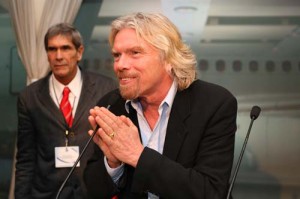
At a celebration at the United Nations on March 1 to celebrate ORBIS International’s 25th anniversary, A.L. Ueltschi, chairman of FlightSafety International and the ORBIS Board of Directors, launched a global call for action with a $10 million lead gift.
Hundreds of diplomats, business leaders and healthcare professionals gathered at the United Nations on March 1 to celebrate ORBIS International’s 25th anniversary. In honor of the milestone, Mayor Michael R. Bloomberg proclaimed March 1 “ORBIS Day” in New York City.
Best known for operating the world’s only Flying Eye Hospital, ORBIS is dedicated to saving sight worldwide. Through its work, millions of people who were once blind can now see. More than 80 heads of state and the past three secretaries-general of the United Nations have praised ORBIS as a unique diplomatic ambassador, promoting peace and cooperation between nations.
“For a quarter of a century, we’ve built a global network of committed people who share the goal of alleviating human suffering,” said Oliver Foot, ORBIS International president and executive director. “During this time, enduring professional friendships have been forged. Throughout the world, governments and ministers of health have been inspired to join forces and direct their influence and resources to bring sight to millions of people.”
His Excellency Girma Wolde-Giorgis, president of the Federal Democratic Republic of Ethiopia, was the evening’s keynote speaker. He addressed the UN gathering about the growing crisis of blindness, which afflicts more than 37 million lives today, nearly all in developing nations. Seventy-five percent of blindness could be prevented or cured if the eye care so plentiful in the United States was widely available in countries like Ethiopia.
“In my country alone, no less than 10 million people are afflicted by active trachoma, a highly contagious blinding disease that is fast spreading,” Wolde-Giorgis said. “ORBIS has worked tirelessly to eliminate this painful and debilitating disease. On behalf of those people in Ethiopia and around the world whose eyesight has been saved, I thank the ORBIS volunteer doctors who choose to be away from their families and to forsake the comfort of their homes in order to treat those in need.”
One focus in Ethiopia has been the prevention and treatment of trachoma, one of the world’s leading causes of blindness. Pfizer, Inc. has generously donated more than $17 million worth of the antibiotic Zithromax to ORBIS, which through a partnership with the International Trachoma Initiative is being distributed to save the sight of hundreds of thousands of people.

His Excellency Girma Wolde-Giorgis, president of the Federal Democratic Republic of Ethiopia, was the evening’s keynote speaker. He addressed the UN gathering about the growing crisis of blindness.
Every minute, a child goes blind, and every five minutes an adult loses sight to cataract, trachoma, glaucoma or other blinding conditions. To make more people aware that the vast majority of this suffering can be prevented, the Empire State Building joined ORBIS in a global call for action and a new appeal was launched. In recognition of the 28 million people around the world who are needlessly blind, the tower lights of the Empire State Building were turned off for 28 minutes at 20:20 (8:20 p.m. ET). Upon their return, the building’s tower shone blue and white in honor of ORBIS. ORBIS Global Ambassador of Sight Sir Richard Branson led the official countdown to turn off the lights and delivered remarks.
The global call for action was launched with a $10 million lead gift from A.L. Ueltschi, chairman of FlightSafety International and of the ORBIS International Board of Directors. This is the largest gift ever received by ORBIS; the hope is that it will be the beginning of a fund that can reach $100 million.
Since its first program in 1982, the ORBIS Flying Eye Hospital—a fully equipped state-of-the-art surgical and training facility housed inside a specially converted DC-10 aircraft—has made a vital contribution to eye care. In 85 countries, ORBIS has provided a unique venue for intensive sight-saving programs carried out by many of the world’s leading surgeons, all of whom donate their time to operate and to teach. They’ve taught the latest techniques in cataract surgery, corneal transplantation, and how to repair the damage done by blinding conditions that are usually addressed with relative ease in the West.
FedEx Corporation has played an integral role in helping ORBIS realize its vision of a world in which no one is needlessly blind for more than 20 years. In August 2006, FedEx, a global sponsor, announced that it would renew its own substantial commitment with a pledge of $5.5 million over the next five years. As a significant component of the total pledge, FedEx Express delivers ORBIS medical supplies worldwide and literally keeps the Flying Eye Hospital flying—maintaining the aircraft to keep it in excellent working order and providing volunteer flight crews and pilot training.

Sir Richard Branson led the countdown to turn off the tower lights of the Empire State Building. Upon their return, the tower shone blue and white in honor of ORBIS. Oliver Foot, ORBIS president and executive director, is in the background.
Alcon strengthened its 25-year commitment to ORBIS by renewing its global sponsor status with a two-year grant exceeding $2.7 million in cash and medical gifts-in-kind. The grant supports training initiatives in developing countries through a combination of Flying Eye Hospital programs, hospital-based programs, fellowships and online Cyber-Sight consultations. The classroom aboard the ORBIS Flying Eye Hospital is named the Alcon Classroom in recognition of this support, which began even before the ORBIS plane first took flight in 1982.
American International Group, Inc., world leader in insurance and financial services, took its support of ORBIS to a new level by pledging $5 million over five years to expand the nonprofit’s permanent blindness prevention programs in China, India, Vietnam, Bangladesh and Ethiopia and to help enable program growth in Latin America. AIG’s pledge represents the largest corporate gift announced for the blindness prevention work in these specific regions. With this gift, AIG joins founding members Alcon and FedEx in the ORBIS Alliance for Sight and is designated a global sponsor of the organization.
“We know from our experience that enabling people to live healthy, productive lives is critical to economic development,” said Martin J. Sullivan, president and CEO of AIG. “AIG has been involved with ORBIS for 25 years. Today, we’re honoring that history and extending our commitment by helping ORBIS expand its programmatic footprint to deliver sight to millions of people across the developing world.”
For more information about ORBIS International, visit [http://www.orbis.org].











